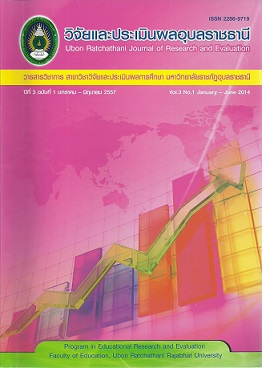Development of Curriculum Evaluation Model for Educational Programs in Graduate School
Abstract
This research aimed to study states and problems of Curriculum Evaluation, also objected to develop the components' indicators of Curriculum Evaluation for Educational Programs in Graduate School. Then, they will be developed in terms of Model and Handbook along with the quality of evaluation for Educational Programs in Graduate School. The research was investigated from the relevant curriculum committee, professors and personals of such Curriculums related to Educational Programs in Graduate School. There were 217 curriculums throughout the country which certified from the total of 438 personals of Office of the Higher Education Commission and Office of the Civil Service Commission. The following curriculums were analyzed and evaluated with Frequency, Percentage, Mean, Standard Deviations, Correlation and Confirmatory Factor Analysis.
The research result found that 88.84 percent of curriculums were already adjusted but there were only 77.57 percent of evaluated curriculums. The main reasons, of both adjustments and evaluation, were preceded along with the Thai Qualifications Framework for Higher Education (TQF). According to this state of problem research, overall, it could be found that, all those curriculums were confronted with the problem of curriculum evaluation the issue of evaluation process mean was the highest.
With regarded to the result of the development of the components and indicators of Curriculum Evaluation for Educational Programs in Graduate School, it could be found that the components of the curriculum evaluation could be categorized into 5 components 111 indicators which were; the first component: Curriculum Document Details consisted of 24 indicators, the second component: Relevance Professors and Personnel related to the curriculums consisted of 25 indicators, the third component: Resources utilized in the Curriculum Procedures consisted of 12 indicators, the fourth component: Knowledge Management System and Curriculum Management consisted of 17 indicators and the fifth component: Graduates of such Curriculums consisted of 33 indicators. Then, the following research results would be conducted in the Curriculum Evaluation Model.
Finally, there were the processes details of the curriculums' evaluations procedures in terms of dimensions of appraises and appraisers in which indicated to proceed within 4 Processes of Model Evaluation Framework as follows; Pre-Evaluation Management, Curriculum Evaluation Design, Curriculum Evaluation Management and Curriculum Evaluation Report and Publication.
In this case, the following processes could be enumerated into 5 processes which were; Self-Study, Planning, Information, Evaluation and Reflection.
References
กลุ่มสาขาวิชามนุษยศาสตร์และสังคมศาสตร์. วิทยานิพนธ์ครุศาสตรดุษฎีบัณฑิต จุฬาลงกรณ์มหาวิทยาลัย, 2551.
กัลยา วานิชย์บัญชา. การวิเคราะห์สถิติชั้นสูงด้วย SPSS for Windows. พิมพ์ครั้งที่ 3. กรุงเทพฯ : ธรรมสาร, 2546.
เกียรติสุดา ศรีสุข. การพัฒนาตัวบ่งชี้ในการประเมินคุณภาพการจัดการศึกษาหลักสูตรมหาบัณฑิตทางการศึกษา : การประยุกต์ใช้วิธีการวิเคราะห์แบบจำลองโครงสร้างเชิงเส้น. ปริญญานิพนธ์การศึกษาดุษฎีบัณฑิต มหาวิทยาลัยศรีนครินทรวิโรฒ, 2545.
คณะกรรมการการศึกษาแห่งชาติ, สำนักงาน. พระราชบัญญัติการศึกษาแห่งชาติ พ.ศ. 2542. กรุงเทพมหานคร : สำนักนายกรัฐมนตรี, 2542.
คณะกรรมการการศึกษาแห่งชาติ, สำนักงาน. ระบบการประกันคุณภาพและมาตรฐานการศึกษาแห่งชาติ :
การอุดมศึกษา (Quality Assurance and Accreditation). กรุงเทพฯ : รายงานการวิจัยประกอบการร่างพระราชบัญญัติการศึกษาแห่งชาติ กลุ่มแผนงานการพัฒนาระบบอุดมศึกษา
สำนักพัฒนานโยบายและวางแผนการจัดการศึกษา, 2541.
. ระบบการประเมินคุณภาพและมาตรฐานการศึกษาแห่งชาติ. กรุงเทพฯ : โรงพิมพ์ชวนพิมพ์, 2540.
. แผนการศึกษาแห่งชาติ (พ.ศ. 2545-2559). พิมพ์ครั้งที่ 3. กรุงเทพฯ : พริกหวานกราฟฟิค, 2546.
คณะกรรมการการอุดมศึกษา, สำนักงาน. เกณฑ์มาตรฐานหลักสูตรระดับบัณฑิตศึกษา พ.ศ. 2548 และแนวทางการบริหารเกณฑ์มาตรฐานหลักสูตรระดับบัณฑิตศึกษา พ.ศ. 2548. สำนักงานคณะกรรมการ
การอุดมศึกษา, 2548.
จำรัส นองมาก. การประกันคุณภาพการศึกษาอย่างถูกต้องและมีความสุข. กรุงเทพฯ : ฟิสิกส์การพิมพ์, 2545.
ทิศนา แขมณี. รวมบทความทางการบริหารและประเมินโครงการ. กรุงเทพฯ : สำนักพิมพ์แห่งจุฬาลงกรณ์มหาวิทยาลัย, 2540.
ยุทธ ไกยวรรณ์. การวิเคราะห์สถิติหลายตัวแปรสำหรับงานวิจัย. กรุงเทพฯ : สำนักพิมพ์แห่งจุฬาลงกรณ์มหาวิทยาลัย, 2556.
เลขาธิการคุรุสภา, สำนักงาน. การรับรองปริญญาและประกาศนียบัตรทางการศึกษาเพื่อการประกอบวิชาชีพ. กรุงเทพฯ : สำนักงานเลขาธิการคุรุสภา, 2548.
วิชัย วงษ์ใหญ่. พัฒนาหลักสูตรและการสอนมิติใหม่. กรุงเทพฯ : สุวีริยาสาส์น, 2534.
ศึกษาธิการ, กระทรวง. เกณฑ์มาตรฐานหลักสูตรระดับบัณฑิตศึกษา พ.ศ. 2548. กรุงเทพฯ : กระทรวงศึกษาธิการ, 2548.
อำนาจ จันทร์แป้น. การวิเคราะห์หลักสูตร. เอกสารประกอบการบรรยาย วิชา ลส. 73. เชียงใหม่ :
คณะศึกษาศาสตร์ มหาวิทยาลัยเชียงใหม่, 2530.
อุทุมพร จามรมาน. การประกันคุณภาพระดับอุดมศึกษา. กรุงเทพฯ : ฟันนี่พับลิชชิ่ง, 2543.
. การประกันคุณภาพระดับอุดมศึกษาตามเกณฑ์ของทบวงมหาวิทยาลัย. กรุงเทพฯ :
คณะครุศาสตร์ จุฬาลงกรณ์มหาวิทยาลัย, 2541.
Borg, W. R., and M. D. Gall. Educational research. New York : Longman, 1989.
Joint Committee on Standards for Educational Evaluation. The Program Evaluation Standards :
How to Assess Evaluations of Educational Programs. 2nd ed. Thousand Oaks, CA: Sage, 1994.
McGettrick, A. and N. Mansor. “Standards and Level-a case study,” Assessment & Evaluation in Higher Education. 24,2 (1999) : 131-140.
Stufflebeam, Daniel. Educational Evaluation and Decision Making Itasca. lll.: F.E. Peacock Publishers, Inc. 1974.
Downloads
Published
How to Cite
Issue
Section
License
1. บทความที่ตีพิมพ์ในวารสารนี้ได้มีการตรวจสอบการลอกเลียนงานวรรณกรรมแล้ว ไม่เกินร้อยละ 25
2. บทความที่ตีพิมพ์ในวารสารนี้เป็นข้อคิดเห็น ข้อค้นพบของผู้เขียนบทความ โดยผู้เขียนบทความต้องเป็นผู้รับผิดชอบต่อผลทางกฎหมายใด ๆ ที่อาจเกิดขึ้นจากบทความนั้น ๆ
3. บทความ ข้อมูล เนื้อหา รูปภาพ ฯลฯ ที่ได้รับการตีพิมพ์ในวารสารวิจัยและประเมินผลอุบลราชธานี ถือเป็นลิขสิทธิ์ของวารสารวิจัยและประเมินผลอุบลราชธานี หากบุคคลหรือหน่วยงานใดต้องการนำทั้งหมดไปเผยแพร่ต่อหรือเพื่อกระทำการใดๆ จะต้องได้รับอนุญาตเป็นลายลักษณ์อักษรจากวารสารวิจัยและประเมินผลอุบลราชธานีก่อนเท่านั้น และจะต้องมีการอ้างอิงวารสารวิจัยและประเมินผลอุบลราชธานี ฉบับนั้น ๆ ด้วย






